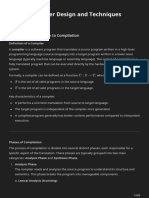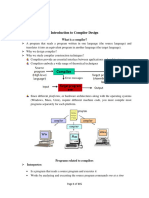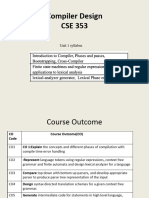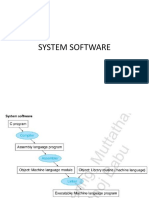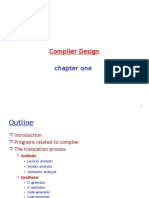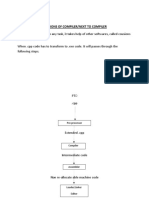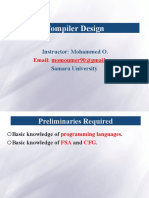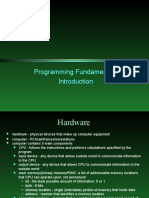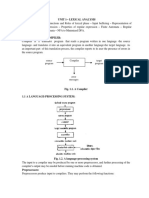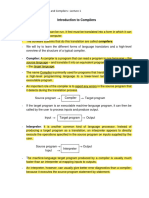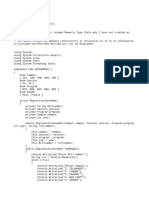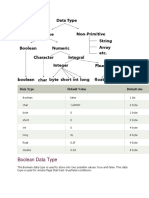07 34 Eci
07 34 Eci
Uploaded by
Dung OngCopyright:
Available Formats
07 34 Eci
07 34 Eci
Uploaded by
Dung OngOriginal Title
Copyright
Available Formats
Share this document
Did you find this document useful?
Is this content inappropriate?
Copyright:
Available Formats
07 34 Eci
07 34 Eci
Uploaded by
Dung OngCopyright:
Available Formats
5—External Compiler Interface
5 External Compiler Interface
This section describes the External Compiler Interface (ECI). ECI is a
specification for interfacing with third-party compiler and linker programs. ECI
programs translate generic compiler and linker commands into commands
targeting specific compiler tools. This allows compiler, linker, archiver, etc.
commands to be issued in a portable format which then is translated to conform
to conventions and requirements of specific tools. For the remainder of this
document, compiler is used as a term to describe all such code-generation
tools.
OPNET Modeler includes several scripts and utility programs which implement
the ECI translation for popular Windows and Linux compilers. Using the
External Compiler Interface Specification, you can generate interface programs
to allow the use of compilers not directly supported in the release.
External Compiler Interface Specification
External Compiler Interface (ECI) programs expect command-line arguments
consisting of abstract commands as input for translation. The format of the
command-lines is designed to be easily-parsed. It is a series of alternating
labels and values. Each label is a short token. Each value is a string which will
usually be integrated unaltered into the final command line passed to the
compiler. Certain label tokens may require multiple values; in this case, each
value is passed as a separate parameter, and the list is terminated by a special
“end-of-list” token.
ECI translators are required to return the compiler’s exit status to their caller.
This provides the ability to determine whether a particular abstract command
that it generated had succeeded.
A feature of Windows-based compilers is the ability to read options from a
separate file and treat them as though they had been specified on the command
line. Such a file is sometimes called a response file (this term is used in this
section). The response file is intended as a work-around for the relatively small
size limit of command strings under Windows.
For more information, see:
• Tokens
• Commands
Tokens
The following tokens are used in abstract commands:
• OP <operation>—specifies the operation to perform. Values can be one of
arch, bind, bind_so, comp, or comp_so.
EI-5-1 OPNET Modeler/Release 16.1
5—External Compiler Interface
• IF <filename>—specifies the input file to the compilation process. This may
be a source file, an object file, or a response file which lists a number of
object files.
• OF <filename>—specifies the output file of the compilation process. This
may be an object file, a static library, a shared object (dynamic-linked library),
or an executable program.
• XF <filename>—specifies a file containing a list of symbols which are to be
exported from a shared object. This is specified under Windows and can be
ignored for Linux platforms.
• FL <flags…>—specifies one or more flags to be passed through to the
compiler. This list is terminated by a token consisting of a double colon.
These flags will usually be specified by the user via a preference.
• IN <include dir>—specifies the name of an additional directory in which the
compiler should search for header files. Since a single additional directory is
specified, this is not a list token.
• LB <libraries…>—specifies one or more libraries to be passed to the linker.
The libraries may be specified by the user via a preference, by
OPNET Modeler, or both.
• VM—specifies that the script or compiler print to standard output the exact
compilation or linking command (including flags) it sent to the operating
system. This is useful for gathering information when you have trouble
compiling or linking code.
• TA <target>—specifies the target architecture for compilation. <target> can
be 32bit or 64bit.
Note—Printing the command typically causes the top-level compilation or
linking operation to fail. Therefore, use this token only when performing
diagnostics or debugging.
OPNET Modeler/Release 16.1 EI-5-2
5—External Compiler Interface
Commands
Four different operations require the generation of an abstract command:
• Compiling on page EI-5-3
• Binding Executables on page EI-5-4
• Binding Shared Objects on page EI-5-5
• Archiving on page EI-5-6
For each operation, a template command is shown, followed by a description of
each value in the command with its origin.
Compiling
<comp_prog> OP <operation> IF <input_file> OF <output_file>
IN <include_dir> FL <comp_flags…> ::
where comp_prog and comp_flags come from preferences, while the remaining
options are generated by OPNET Modeler. The value of operation is comp_so
if the object code must be relocatable (if it is to go into a shared object), or comp
if the object code does not need to be relocatable. Information about this
command is listed in the following table.
Table 5-1 Compile Command Options
Component Description
comp_prog The name of the ECI translator which will generate a command or
commands to compile the input file to the output file.
operation One of comp or comp_so.
input_file The name of the source file to compile.
output_file The name of the destination object file.
include_dir The name of an include directory to add to the include path of the
compiler.
comp_flags User-specified flags to pass on to the compiler.
End of Table 5-1
EI-5-3 OPNET Modeler/Release 16.1
5—External Compiler Interface
Binding Executables
<bind_static_prog> OP bind IF <input_file> OF <output_file>
FL <bind_static_flags> :: LB <archive> <bind_static_libs> ::
where bind_static_prog, bind_static_flags, and bind_static_libs come from
preferences, and the rest are generated by OPNET Modeler. archive is the input
archive library file (i.e. the “.si.a” file). Information about this command is listed
in the following table.
Table 5-2 Bind Executables Command Options
Component Description
bind_static_prog The name of the ECI translator which will generate a command or
commands to link the input file with the archive and static libraries
to form an output file executable.
input_file The name of the main object file to link with the archives and other
libraries.
output_file The name of the destination executable file.
bind_static_flags User-specified flags to pass on to the linker.
archive Name of archive library to include in the executable.
bind_static_libs User-specified static libraries to include in the linking.
End of Table 5-2
OPNET Modeler/Release 16.1 EI-5-4
5—External Compiler Interface
Binding Shared Objects
<bind_shobj_prog> OP bind_so IF <input_file> OF <output_file>
XF <export_file> FL <bind_shobj_flags> :: LB <libraries> ::
where bind_shobj_prog and bind_shobj_flags come from preferences, and the
rest are generated by OPNET Modeler. The libraries are only specified under
Windows, where they are necessary for generating DLLs. Here, input_file will
be a response file listing the object files that will go into the shared library and
export_file lists the external symbols in the library (not necessary under Linux).
Information about this command is listed in the following table.
Table 5-3 Binding Shared Objects Command Options
Component Description
bind_shobj_prog The name of the ECI translator which will generate a command or
commands to link the input files with the libraries to form a shared
object library.
input_file The name of the response file which contains the names of object
files to link into the shared library.
output_file The name of the destination shared object library.
export_file The name of a file listing external symbols in the library (Windows
only).
bind_shobj_flags User-specified flags to pass on to the linker.
libraries Libraries to include in the link phase, necessary under Windows to
generate shared object libraries. These libraries are specified by
OPNET Modeler.
End of Table 5-3
EI-5-5 OPNET Modeler/Release 16.1
5—External Compiler Interface
Archiving
<arch_prog> OP arch IF <input_file> OF <output_file>
where arch_prog is a preference. As above, input_file will be a response file.
Information about this command is listed in the following table.
Table 5-4 Archiving Command Options
Component Description
arch_prog The name of the Eci translator which will generate a command or
comma to place the files listed in the input response file into a
static library.
input_file The name of the response file which contains the names of object
files to link into the static library.
output_file The name of the destination static object library.
End of Table 5-4
OPNET Modeler/Release 16.1 EI-5-6
You might also like
- DBA-110 Chapter 4 ReviewQuestionsDocument2 pagesDBA-110 Chapter 4 ReviewQuestionsnikkie70488% (16)
- Reference To An Entity That Precedes Its Definition in The Program Is Called Forward Reference.) Handling The Forward Reference in ADocument4 pagesReference To An Entity That Precedes Its Definition in The Program Is Called Forward Reference.) Handling The Forward Reference in Asolo 2002No ratings yet
- PCC All Units QuestionBankDocument121 pagesPCC All Units QuestionBankimakhil.1684No ratings yet
- Compilation ProcessDocument31 pagesCompilation ProcessVignesh VasudevanNo ratings yet
- CD 1Document21 pagesCD 1Priya MannemNo ratings yet
- Cse (205) : Data Structures: SynopsisDocument4 pagesCse (205) : Data Structures: SynopsisParitosh GuptaNo ratings yet
- Chapter 1 - IntroductionDocument13 pagesChapter 1 - Introductionom55500rNo ratings yet
- Unit - I Lexical Analysis TranslatorDocument13 pagesUnit - I Lexical Analysis TranslatorUltimate LegendNo ratings yet
- System Software Solve PaperDocument13 pagesSystem Software Solve PaperArthiNo ratings yet
- Building A Fortran CLIDocument6 pagesBuilding A Fortran CLISamuel ForknerNo ratings yet
- Compiler DesignDocument5 pagesCompiler Designsugeelgundoo121No ratings yet
- A Compiler Is A Computer ProgramDocument6 pagesA Compiler Is A Computer Programapi-26190816No ratings yet
- CD Unit IDocument13 pagesCD Unit IMeghnadhNo ratings yet
- Compiler Design-NotesDocument212 pagesCompiler Design-NotescsehodNo ratings yet
- Compiler Design Lecture NotesDocument308 pagesCompiler Design Lecture NotesShashank SNo ratings yet
- Compiler Design Note1Document111 pagesCompiler Design Note1Success CollegeNo ratings yet
- 01 IntroToCompilersDocument41 pages01 IntroToCompilershafsaahadbuttNo ratings yet
- Core Java Some Important Points To RememberDocument26 pagesCore Java Some Important Points To Rememberapi-2593060380% (5)
- CD Unit1 NotesDocument28 pagesCD Unit1 NotesSharmili Nukapeyi NNo ratings yet
- CSE353 SlidesDocument76 pagesCSE353 SlidesAyush JindalNo ratings yet
- SPCC CheatDocument1 pageSPCC Cheatvapog80368No ratings yet
- CD - Unit IDocument30 pagesCD - Unit IKande Archana KNo ratings yet
- ManjakkudiDocument158 pagesManjakkudipriyaabi011No ratings yet
- Wa0023.Document10 pagesWa0023.patoorthejasweeNo ratings yet
- Language Processing SystemDocument20 pagesLanguage Processing SystemKashmala AlamNo ratings yet
- 13 CD - Runtime Env 3Document38 pages13 CD - Runtime Env 3singamsettysanjana04No ratings yet
- CD IntroductionDocument32 pagesCD IntroductionJohn SonNo ratings yet
- Unit 5 FinalDocument31 pagesUnit 5 FinalraviNo ratings yet
- 03 - IntroAssemblyDocument57 pages03 - IntroAssemblykingorijoseph180No ratings yet
- Compiler Design IntroductionDocument4 pagesCompiler Design IntroductionSudeshna KunduNo ratings yet
- Embedded Systems: Department of Electrical and Computer Engineering MWU UniversityDocument32 pagesEmbedded Systems: Department of Electrical and Computer Engineering MWU UniversitySamuel AdamuNo ratings yet
- BedasaDocument31 pagesBedasabedasabekuma331No ratings yet
- Unit 1 SlidesDocument49 pagesUnit 1 SlidesAyush JindalNo ratings yet
- Library HeaderDocument32 pagesLibrary HeaderAimee O.No ratings yet
- Unit 1 - CD Cs3501Document24 pagesUnit 1 - CD Cs3501harishkarnan004No ratings yet
- CAM4 System SoftwareDocument54 pagesCAM4 System Softwarenamitha rNo ratings yet
- Tooling Part 2Document55 pagesTooling Part 2abdelrhmandeab20No ratings yet
- Chapter 1Document42 pagesChapter 1Abdisa KebedeNo ratings yet
- Learning Materials, CD, Unit-1 (Btech-5th Sem)Document12 pagesLearning Materials, CD, Unit-1 (Btech-5th Sem)banakumar ghoshNo ratings yet
- Chapter 1 - Introduction To CompDocument27 pagesChapter 1 - Introduction To CompAschalew AyeleNo ratings yet
- Compiler ConstructionDocument5 pagesCompiler Constructionsyed hamzaNo ratings yet
- Compiler Design: Instructor: Mohammed O. Samara UniversityDocument28 pagesCompiler Design: Instructor: Mohammed O. Samara UniversityYitbarek Murche100% (1)
- UNIT-5 Fundamentals of Information Technology (Question and Answers)Document15 pagesUNIT-5 Fundamentals of Information Technology (Question and Answers)Dr. S.K. SajanNo ratings yet
- L01 IntroDocument11 pagesL01 IntroMUHAMMAD HASEEB ASHRAF MUHAMMAD ASHRAFNo ratings yet
- CC1Document6 pagesCC1Sushant ThiteNo ratings yet
- CSC411 Compiler Construction - MO Onyesolu and OU Ekwealor - First Semester 2020/2021 SessionDocument27 pagesCSC411 Compiler Construction - MO Onyesolu and OU Ekwealor - First Semester 2020/2021 SessionKelly IsaacNo ratings yet
- Assignment No.: 01: Name: Shraddha Umesh Mulay Roll No.: 221083 GR No.: 22020260 Sy-ADocument8 pagesAssignment No.: 01: Name: Shraddha Umesh Mulay Roll No.: 221083 GR No.: 22020260 Sy-Ashraddha mulayNo ratings yet
- One Line Ques Ans1Document11 pagesOne Line Ques Ans1Nikhil Patkal100% (1)
- Assignment SCDlabDocument5 pagesAssignment SCDlabNoor-Ul AinNo ratings yet
- Unit 1Document19 pagesUnit 1Mohana SubbuNo ratings yet
- L Lpic1 v3 103 1 PDFDocument23 pagesL Lpic1 v3 103 1 PDFJelaiNo ratings yet
- Compiler Design Chapter-1Document41 pagesCompiler Design Chapter-1Vuggam VenkateshNo ratings yet
- LN1 - C1 - Introduction To CompilersDocument4 pagesLN1 - C1 - Introduction To CompilersMehrab Rabbi RatinNo ratings yet
- LT Unit 3 Notes 2017Document28 pagesLT Unit 3 Notes 2017Shantha JayakumarNo ratings yet
- Programming Language HandoutDocument75 pagesProgramming Language HandoutDr Narayana Swamy RamaiahNo ratings yet
- PT 849 Req D PatchesDocument34 pagesPT 849 Req D PatchesxwNo ratings yet
- Core Course Viii Compiler Design Unit IDocument27 pagesCore Course Viii Compiler Design Unit Iவெ. விஷ்வாNo ratings yet
- Compilation StagesDocument2 pagesCompilation StagesVidhya DharanNo ratings yet
- Embedded Systems: Assembly Language SyntaxDocument18 pagesEmbedded Systems: Assembly Language SyntaxyekoyetigabuNo ratings yet
- 09 16 NtrefDocument49 pages09 16 NtrefDung OngNo ratings yet
- 06 31 PFDocument6 pages06 31 PFDung OngNo ratings yet
- 06 56 IcDocument13 pages06 56 IcDung OngNo ratings yet
- 09 10 PrrefDocument7 pages09 10 PrrefDung OngNo ratings yet
- 06 22 PRDocument26 pages06 22 PRDung OngNo ratings yet
- 01 13 FramDocument101 pages01 13 FramDung OngNo ratings yet
- 01 34 DatanDocument61 pages01 34 DatanDung OngNo ratings yet
- Data Structure AucseDocument10 pagesData Structure AucseJagannath SathwikNo ratings yet
- Problem 10 Problem Set 10.3A Page 414: Maximize Z y y y Subject To y +y + +y C, y 0Document35 pagesProblem 10 Problem Set 10.3A Page 414: Maximize Z y y y Subject To y +y + +y C, y 0Angad SehdevNo ratings yet
- NLP Final ReportDocument2 pagesNLP Final Reportapi-436856993No ratings yet
- Microcontrollers 8051-Notes For IV Sem StudentsDocument60 pagesMicrocontrollers 8051-Notes For IV Sem StudentsDr Ravi Kumar A.VNo ratings yet
- SystemVerilog Constraint Layering Via Reusable Randomization Policy ClassesDocument11 pagesSystemVerilog Constraint Layering Via Reusable Randomization Policy ClassesninjaNo ratings yet
- Gpasswd CommandDocument4 pagesGpasswd CommandDarkoNo ratings yet
- White Paper - CRM Contact Person Replication - 09feb10Document11 pagesWhite Paper - CRM Contact Person Replication - 09feb10sharif.inamdarNo ratings yet
- Page 1 of 2Document0 pagesPage 1 of 2Pratyush MishraNo ratings yet
- Bitwise OperationsDocument12 pagesBitwise OperationsAnuruddha Bhattacharjee JohnNo ratings yet
- Advanced Windows DebuggingDocument19 pagesAdvanced Windows DebuggingArwen ElfNo ratings yet
- Setup 4Document30 pagesSetup 4SubhransuNo ratings yet
- PgfganttDocument59 pagesPgfganttCodera PurpaNo ratings yet
- Problem Analysis ChartDocument5 pagesProblem Analysis Chart嘉群No ratings yet
- Lab Assignment 1Document10 pagesLab Assignment 1Hassan ShahNo ratings yet
- Javascript PrefiDocument66 pagesJavascript Prefiguendelyn omegaNo ratings yet
- SQL AssignmentsDocument3 pagesSQL AssignmentsalivaNo ratings yet
- Chapter 1 Introduction To Computers, Programs, and JavaDocument63 pagesChapter 1 Introduction To Computers, Programs, and JavaUmi Azianawati Abd AzizNo ratings yet
- UNIT-2: Inheritance, Interface and PackageDocument40 pagesUNIT-2: Inheritance, Interface and PackageAbhigna NadupalliNo ratings yet
- 2-V BasicDocument30 pages2-V Basicمؤمل علي محسن منشدNo ratings yet
- STE Unit4Document4 pagesSTE Unit4Mharukh ShaikhNo ratings yet
- ECE 3120 Computer Systems Shift and RotateDocument19 pagesECE 3120 Computer Systems Shift and RotateAir_zaNo ratings yet
- Region ManipulationDocument4 pagesRegion ManipulationKunalAgarwalNo ratings yet
- Fs CV Trunglm5Document2 pagesFs CV Trunglm5Minh Trung LêNo ratings yet
- DAA-Assignment - 1Document3 pagesDAA-Assignment - 1Hanith CgNo ratings yet
- Autodesk Maya Modeling, Animation, Scripting and C++ Programming 2016-17Document18 pagesAutodesk Maya Modeling, Animation, Scripting and C++ Programming 2016-17ej victoriaNo ratings yet
- C Programming Rajesh PandeyDocument177 pagesC Programming Rajesh Pandeytombolatesfaye0No ratings yet
- Data TypeDocument4 pagesData TypeAshish RajputNo ratings yet
- Exception Handling JavaDocument21 pagesException Handling JavaSaptadip SahaNo ratings yet
- DMS (22319) - Chapter 3 NotesDocument83 pagesDMS (22319) - Chapter 3 Notespdijgqam1nNo ratings yet














